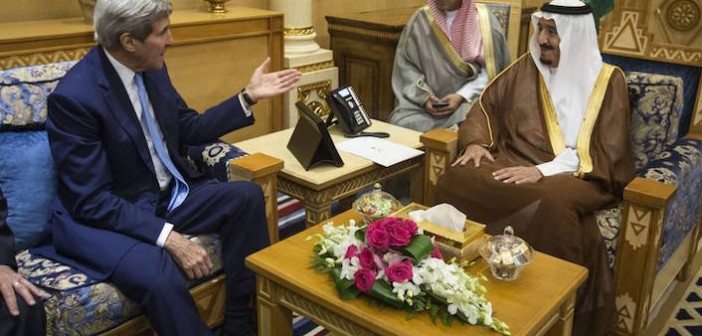U.S. officials concerned that Iran-Saudi conflict could undermine broader efforts in Middle East
WASHINGTON—The sudden upheaval that shattered ties between Iran and Saudi Arabia over the weekend also saddled the Obama administration with unexpected complications in what already was a long-shot bid to ease the crises of the Middle East.
Administration officials voiced rising concern that the conflict between Iran and Saudi Arabia could undermine their broader regional efforts—in particular ending the Syrian civil war.
Secretary of State John Kerry had been pressing Tehran and Riyadh for months to establish a direct diplomatic channel to address the Syria conflict.
The two countries reluctantly agreed late in 2015 to join a multinational peace process. That led to a United Nations plan for a cease-fire and peace talks, but the latest developments raise questions about its viability.
The conflict is also exposing deteriorating relations between the U.S. and Saudi Arabia under President Barack Obama. Saudi officials have repeatedly pressed the White House to take more-aggressive steps to check what they say is Iran’s regionwide efforts to destabilize Arab countries.
Saudi officials have warned that the nuclear agreement reached in July between world powers and Iran would significantly strengthen Iran’s finances while only scaling back its nuclear capabilities for a few years.
Under the deal, Iran in the coming months is set to receive as much as $100 billion in frozen oil revenues, which could be used to support its proxies in Iraq, Lebanon, Syria and Yemen.
Saudi Arabia has adopted a more aggressive foreign policy since King Salman ascended the throne last year. With his 30-year-old son Prince Mohammed installed as defense minister, the kingdom has confronted Iran more directly than before, including the air war against Iranian-backed militias in Yemen and the establishment of a pan-Arab military force to be deployed against regional threats.
Saudi officials this weekend dismissed the concerns in the Obama administration about the kingdom’s execution of prominent Shiite cleric Nemer al-Nemer and the severing of diplomatic ties with Tehran.
“The feeling is that enough is enough. Tehran continues to sponsor terrorism and launch ballistic missiles and no one is doing anything about it,” said a person briefed on the Saudi government’s thinking in recent days.
Arab governments and even lawmakers in the U.S. Democratic Party were alarmed when the White House backtracked on planned new sanctions against Iran for its ballistic-missile tests.
The White House notified Congress on Wednesday it would impose the penalties but abruptly reversed its decision and gave no clear timeline of when they would be imposed.
“I am disappointed that the administration has delayed punitive action in response to Iran’s recent ballistic missile tests. We are always in a sensitive moment in our dealings with Iran, and there is never a perfect time to undertake such actions,” said Rep. Steny Hoyer of Maryland, the No. 2 Democrat in the House of Representatives, who backed the agreement.
As the conflict deepened over the weekend, with Saudi Arabia officially severing ties with Iran, U.S. officials expressed skepticism over how much influence Washington had in heading off a conflict based on centuries-old religious divisions.
Relations between Washington and Riyadh haven’t thawed since King Salman took the throne a year ago. The leader didn’t turn up at summit Mr. Obama held in May at the presidential retreat in Camp David for leaders of the Gulf Cooperation Council. Saudi officials have complained that the White House never substantively followed up on pledges made at the summit to strengthen the defenses of the Arab monarchies through increased arms sales and intelligence sharing.
Arab officials and several Middle East analysts said a further escalation between Saudi Arabia and Iran would place the U.S. in an even trickier diplomatic bind.
The U.S. is Saudi Arabia’s most important arms supplier and military ally, and would be expected to back the Saudi monarchy if the conflict were to escalate.
At the same time, Mr. Obama has made the nuclear agreement with Iran, and potentially improved ties, his most important foreign policy initiative.
“At some point, the U.S. may be forced to take sides,” said a person close to the Saudi government. “This could potentially threaten the nuclear deal.”
Arab diplomats said the pressure on the U.S. to distance itself from Iran will likely increase in the coming days. Saudi Arabia’s closest Arab allies, such as Bahrain, are expected to follow Riyadh’s diplomatic lead and sever or downgrade their relations with Tehran as well.
Despite accusations that it has tilted the regional power balance toward Iran, the Obama administration still has drawn criticism for what some see as a permissive attitude toward Saudi Arabia. The State Department routinely targets Riyadh as a top human-rights offender, citing a plethora of abuses, including lack of due process in its criminal justice system. Officials say they regularly press the regime on rights issues.
Despite that criticism, the State Department in September supported Saudi Arabia’s leadership on an influential United Nations human-rights panel, fueling criticism—from Shiite activists as well as human-rights advocates—that the U.S. hasn’t done enough to urge changes.
“The U.S. has never been particularly proactive or interested in Saudi human rights abuses,” said Adam Coogle, a Middle East researcher at Human Rights Watch. “It has always seemingly privileged economic interests over human rights concerns in its relationship.”
At most, Washington has expressed concern over cases that are particularly egregious, but never really harshly criticizes Saudi Arabia, he said. “Saudi Arabia certainly knows they face very little resistance from the U.S.,” Mr. Coogle said.
—Ian Talley contributed to this article.
Write to Jay Solomon at jay.solomon@wsj.com

